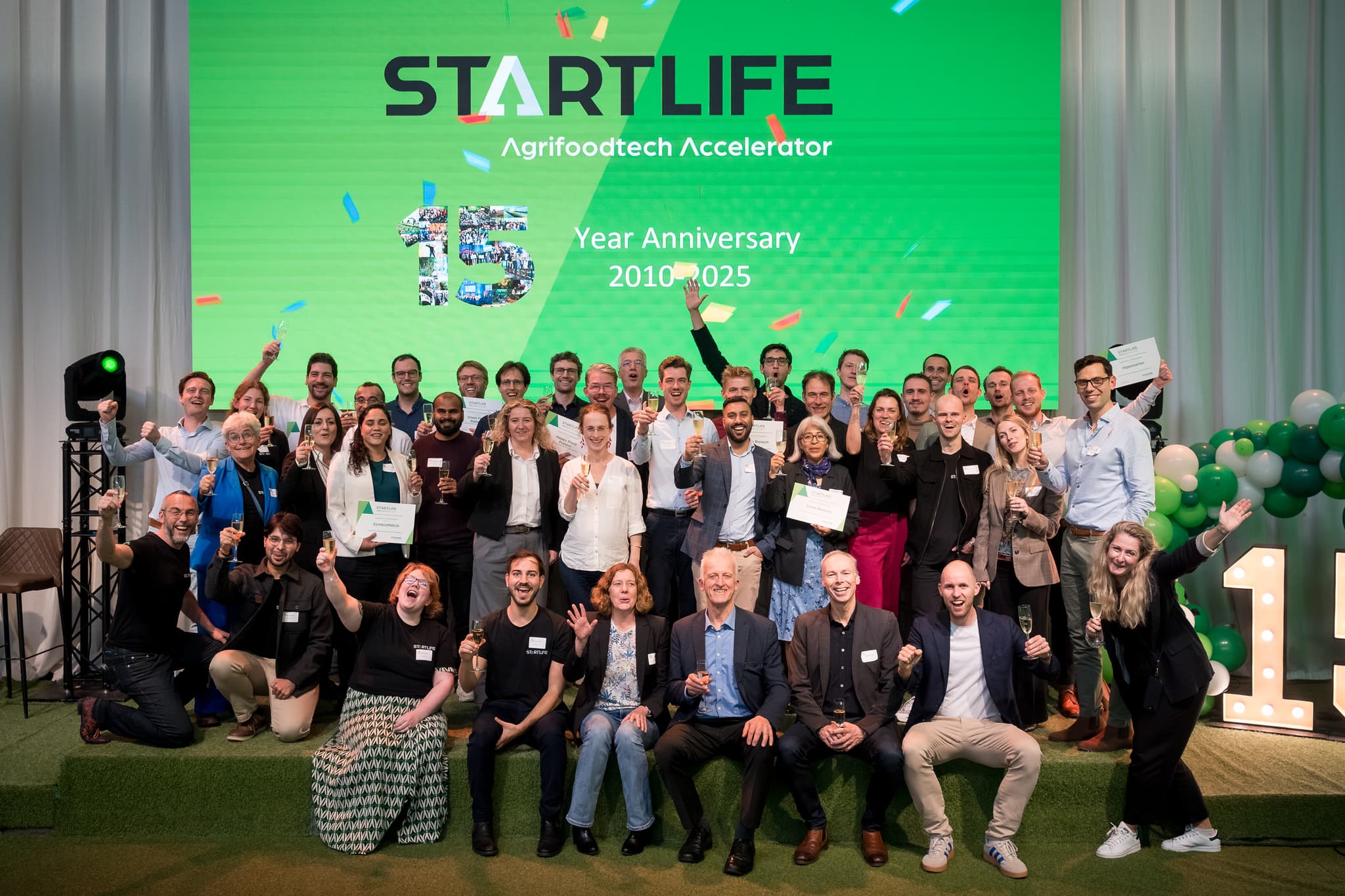NIUM’s gut-on-a-chip unlocks the future of food and health
StartLife startup bridges the gap between gut complexity and innovation in nutrition research.
Published on December 6, 2025
NIUM - Adam Selamnia & Alberto Noronha © Silicon Luxembourg
Bart, co-founder of Media52 and Professor of Journalism oversees IO+, events, and Laio. A journalist at heart, he keeps writing as many stories as possible.
At StartLife’s 15th anniversary celebration in Ede, eleven pioneering agrifoodtech startups took the stage to show how science and entrepreneurship can reshape the future of food. From smarter biostimulants and energy-efficient farming robots to next-generation proteins and nutrient innovations, each team presented a bold solution to one of the world’s most urgent challenges: feeding a growing population within planetary limits. In this IO+ series, we highlight their stories; not just the technologies they’re building, but also their vision and the advice they received from the expert panels. Today, we focus on Luxembourg-based NIUM.
When Alberto Noronha stepped onto the stage at the World Food Center in Ede as the first startup for Demo Day, the room was already buzzing. It was StartLife’s 15th anniversary celebration, a full-day celebration of Dutch agrifoodtech innovation. When Noronha began talking about the gut, the audience leaned in.
“The gut,” he began, “is one of the fastest-growing areas of focus in the food, health, and wellness industries today. There’s an absolute race to create the next generation of pre-, pro-, and post-biotics. But the gut is incredibly complex, and very difficult to study.”
That complexity, he explained, is precisely what has held back innovation. Traditional lab models and animal testing often fail to accurately replicate how the human gut actually behaves. “Current modeling technologies are either too simplistic or too expensive,” Noronha said. “That creates a huge bottleneck for innovation.”
Replicating the human gut on a chip
That’s where NIUM’s breakthrough comes in. The company has developed iMAT, a microphysiological system — or as Noronha puts it, “a human gut on a chip.” The platform enables researchers and food companies to test how new ingredients or nutritional products interact with the gut microbiome in a way that is far more predictive of real human biology.
“Essentially, we’re replicating the human gut on a chip,” he said. “This allows companies and research groups to assess the impact of nutrition products on the gut in a much more relevant way.”
Launched in 2024, the iMAT has already found traction among food and health companies eager to replace outdated models with something faster, more scalable, and scientifically robust. “We’re currently working with several companies to help them develop new products,” Noronha told the crowd. “And next year, we expect to ship our first physical units.”
Balancing fidelity and scalability
In a field crowded with startups chasing the microbiome trend, NIUM stands out by solving a fundamental technical dilemma: how to balance fidelity - accurately mimicking the human gut - with scalability. “That compromise has always been the limiting factor,” Noronha explained. “You can build a highly accurate model, but then it becomes too expensive or too complex to scale. We’re addressing that compromise head-on.”
NIUM’s proprietary technology is already protected by several patents, with more pending. The company has also secured co-funding and strategic partnerships to accelerate development. Its team of 11 blends deep scientific expertise in biology, nutrition, and engineering with the entrepreneurial mindset needed to bring such a complex technology to market.
From food to feed
The discussion following the pitch revealed the wide potential impact of NIUM. Members of the expert panel were quick to point out that microbiome research isn’t limited to human health; it also plays a critical role in animal nutrition and farming efficiency.
“There’s a real hype about the microbiome,” one panelist noted, “but we’re still at the beginning of a very long journey. You need corporate partners to test whether your product truly fits the market needs. And don’t forget the feed or farm animal side; it’s a perfect environment for discovering and validating microbiome patterns.”
Noronha nodded. “We’ve already seen interest from the animal industry,” he said. “Our platform’s modularity allows us to model different organisms, human or animal. The ability to test hypotheses across species is actually one of our biggest strengths.”
The right partners and the right people
For NIUM, partnership is more than just capital. It’s about finding the right allies to validate and scale the technology. “Partnerships are definitely important,” Noronha said during the exchange. “But you have to be careful, think about the future. Some partners can limit your flexibility too early.”
Another panelist added a practical note from experience: “Finding the right person inside an organization is often the hardest part. You can talk to R&D, but if there’s no internal champion, it’s very hard to move forward. The key is to find the people who can actually make decisions.”
Noronha smiled. “That’s absolutely true. Our successes so far have come from working with research-heavy organizations, those with scientists who really understand the potential. It’s not easy, but it’s worth it.”
A clear path ahead
NIUM is now raising funds to scale production of its iMAT devices. The team continues to refine the platform and add new functionalities — with one goal in mind: to make gut research more predictive, accessible, and actionable for the food and health industries.
As the applause faded and the next startup prepared to pitch, it was clear that NIUM’s vision resonated deeply with the crowd. In an era when health and sustainability increasingly converge, understanding the gut might well be the key to understanding ourselves, and NIUM wants to make that exploration possible.

15 years Startlife
Read about all the startups that were part of StartLife’s 15th anniversary Demo Day.
